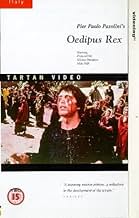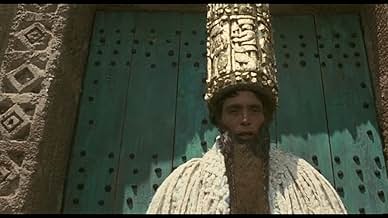IMDb RATING
7.2/10
7.4K
YOUR RATING
Rescued from abandonment and raised by the King and Queen, Oedipus is still haunted by a prophecy--he'll murder his father and marry his mother.Rescued from abandonment and raised by the King and Queen, Oedipus is still haunted by a prophecy--he'll murder his father and marry his mother.Rescued from abandonment and raised by the King and Queen, Oedipus is still haunted by a prophecy--he'll murder his father and marry his mother.
- Director
- Writers
- Stars
- Awards
- 4 wins & 4 nominations total
Giovanni Ivan Scratuglia
- Sacerdote
- (as Ivan Scratuglia)
Laura Betti
- Jocasta's Maid
- (uncredited)
Pier Paolo Pasolini
- High Priest
- (uncredited)
Isabel Ruth
- Jocasta's Maid with a Lamb
- (uncredited)
- Director
- Writers
- All cast & crew
- Production, box office & more at IMDbPro
Featured reviews
Pasolini tells the drama of a man who knows his destiny from the beginning but does not accept the awareness of evil, tries to escape an atrocious future, but is inevitably entangled in it. The director uses Oedipus, of a classic archetype, to tell the human condition, the inadequacy of those who know they must die, but are unable to accept it.
The Moroccan setting that hides a fantasy Greece, between desert and villages of shepherds, mountains, cities built with clay and destroyed by plagues, is wonderful. A film written in images, dialogues reduced to the essentials, use of captions as in the silent era, intense photography and - for the first time in a Pasolini film - use of color that renders the ocher chromatism of the desert well.
The film have some substantial flaws, especially the storytelling. But the great Pasolini-style shine's brightly throughout the film and Franco Citti is just amazing as Edipo himself.
The Moroccan setting that hides a fantasy Greece, between desert and villages of shepherds, mountains, cities built with clay and destroyed by plagues, is wonderful. A film written in images, dialogues reduced to the essentials, use of captions as in the silent era, intense photography and - for the first time in a Pasolini film - use of color that renders the ocher chromatism of the desert well.
The film have some substantial flaws, especially the storytelling. But the great Pasolini-style shine's brightly throughout the film and Franco Citti is just amazing as Edipo himself.
I was very impressed, I really do think that this is a masterpiece! Pasolini used the original text of Sophocles' tragedy, so the story is tightly knotted, which gives the whole film a tangible urgency. There are, apart from the at times stunning amounts of extra's, only two main actors. Silvana Mangano as Giocasta only appears halfway through the movie and has hardly any lines, but she plays her part impressively by her facial expressions and her stature. Franco Citti as Oedipus is the absolute core of the movie, he dominates the screen with his rugged and fascinating face, he laughs and cries and screams, and all the time stays totally convincing as the self-assured ego-tripping hero, who gradually slips into the awareness that his whole life is based on unspeakable crimes and that he is toyed with by the gods and fate. Some reviewers opinioned he acted way over the top, but I assume it was all deliberately so orchestrated by Pasolini, emphasizing the origin of a Greek tragedy that had to be delivered from an open-air rostrum to a distant audience.
The locations are dazzlingly beautiful, Morocco in fact, not Greece, but it works wonderfully well, as do the weird costumes which look like they were sowed and tinkered by the crew or the many locals themselves, but with the amazing effect of something out of a dream (or nightmare). The musical score is extremely subtle, at many times just the soft bleak rhythmic blows of a single drumstick, with an almost haunting effect.
Strangely enough the prologue and epilogue are set in modern times, this doesn't add anything as far as I'm concerned, but as it was it gives us yet some other beautiful images, with the same vast green lawns and waving tree-tops in the opening and closing scene, completing a perfect circle.
The locations are dazzlingly beautiful, Morocco in fact, not Greece, but it works wonderfully well, as do the weird costumes which look like they were sowed and tinkered by the crew or the many locals themselves, but with the amazing effect of something out of a dream (or nightmare). The musical score is extremely subtle, at many times just the soft bleak rhythmic blows of a single drumstick, with an almost haunting effect.
Strangely enough the prologue and epilogue are set in modern times, this doesn't add anything as far as I'm concerned, but as it was it gives us yet some other beautiful images, with the same vast green lawns and waving tree-tops in the opening and closing scene, completing a perfect circle.
The early and late sequences filmed within Italy are some of the best Pasolini has filmed. His confident and measured pace as well as his eye for composition and love of such basics as trees and sky and grass are a joy to behold. As for the rest, it can be very taxing. The Moroccan desert and mountain scenery is wondrous and the placing and movement of large numbers of peoples impressive but there is a lot of ponderous and somewhat languorous adherence to this titular tale. The associated screaming and passionate pondering as to the ins and outs of past events and just who did what with whom and for why become rather wearing.
Sophocles' Oedipus Rex is adapted well for the foreign screen. Pasolini, better known for the controversial Salo; 120 Days of Sodom, has kept the intensity level to a minimum while still presenting the perverse qualities for which he would be known for. If you don't know the story (like who doesn't) read the play before seeing the movie - there tends to be a shortage on literature freaks these days. Beautifully filmed, Oedipus Rex begins in modern times, continues sometime BC, and finally ends back in the 20th century; thus presenting a sociological thesis for the viewer. The acting is a bit hammy (seeing Oedipus with a mad streak can be over the top) although the characters are developed well and recite their lines as if on stage. My only complaint is the subtitles seem to blend in with the scenery --- white subtitles against a white background. Therefore, this flaw makes it difficult to enjoy some scenes, and Pasolini's poetry is usually superb. Nevertheless, it's still a great film and is worth a look, especially by people with preconceived hatred for Pasolini's later work -and there's definitely a lot out there.
We do ourselves no favour by fixating on how well a film uses every little detail and line in an original text. Certainly, by those standards this is a mediocre, and possibly lazy, film at best. But at the same time there is the problem of being so liberal in one's adaptation that every goes sour, the latest attempt at "Vanity Fair" is a perfect example. But this film, along with Bresson's "Pickpocket," should stand as the rules of adaptation for every young director. Both films are very interpretative, but the directors aren't so naive as to think that mere plot details can constitute a film. So what pushes this film beyond a mere surface-level adaptation? In this case, it takes a deep insight into the nature of Greek tragedy itself. Tragedy's dualism (the representational and the chaotic) is prevalent in all Pasolini's works, it was especially essential in his "Gospel," and I was excited to see how it played out in its own source, and the results are absolutely fantastic. Visually imaginative and so intellectually superior to its contemporaries it seems out of place in film.
5 out of 5 - Essential
5 out of 5 - Essential
Did you know
- ConnectionsEdited into Dias de Nietzsche em Turim (2001)
- How long is Oedipus Rex?Powered by Alexa
Details
- Release date
- Countries of origin
- Languages
- Also known as
- Edipo, el hijo de la fortuna
- Filming locations
- Production companies
- See more company credits at IMDbPro
Box office
- Gross worldwide
- $2,364
- Runtime
- 1h 44m(104 min)
- Aspect ratio
- 1.85 : 1
Contribute to this page
Suggest an edit or add missing content

































